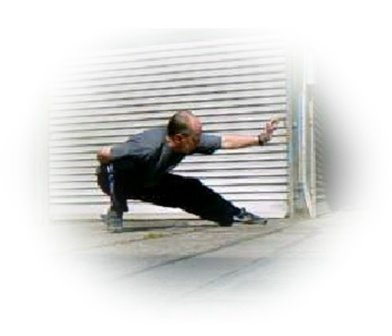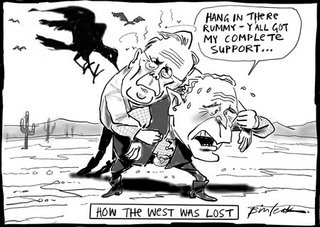Rummy cartoon sport and Jobs
April 15, 2006
GIVEN my lifelong aversion to sport, I was surprised to receive an invitation to lecture on the topic as part of the cultural program for the Commonwealth Games. With the event scheduled for the splendiferous Bendigo Town Hall, I jumped (metaphorically, not physically) at the chance.
You can imagine the horror on everyone’s faces when I heaped abuse on all forms of physical activity excluding sexual intercourse. It was clear that I was a clerical error. The place was packed to the rafters with people who’d expected to hear from the other Phillip Adams – the Olympic shooter. The audience wanted to shoot me – and the organisers wanted to shoot themselves.
Marx was wrong. Sport, not religion, is the opiate of the people. It substitutes for a long list of drugs – everything from Prozac to Viagra via steroids and ecstasy. And that’s just from watching it! To play or support sport is not merely erroneous but testosterroneous, an invitation to become addicted to that most lethal of narcotics, which makes the male gender a danger to itself and the entire planet. Circumcision doesn’t go far enough. It’s time to have Medicare cover castration, particularly for the cast of The Footy Show and soccer hooligans.
Because smoking is linked to lung cancer, there are health warnings on packets of Winfield and Marlboro. There should be even bigger warnings on sporting equipment. Given the thuggish behaviour of those attending matches, boxing gloves and footballs clearly cause brain damage to the fans as well as the participants. Moreover, sport is linked to knee injuries, broken ankles and frequent collisions of skiers with trees and coronaries while jogging. It causes car accidents during those grand prix at Albert Park and Monaco, triggers brawls on and around rugby ovals, and a well-aimed fast ball can overwhelm those codpieces worn by one-day cricketers, thus ending any chance of offspring. And look at the possibility of casualties at Melbourne’s Games, where audience members risked being speared by an ill-aimed javelin or killed by a discus blown off course.
While still a Melburnian, I was hired by Brian Dixon, the football hero who’d become sports minister in Sir Rupert Hamer’s Liberal government, to encourage sporting activity in the wider community. Animator Alexander Stitt and I promptly came up with Life. Be In It, a campaign still running after 30 years. Within days of the launch, there were outbreaks of frisbee-tossing in parks all over Australia, and veritable plagues of kite-flying, canoeing, dog-walking and playing with the kids.
Fortunately, Alex and I realised the error of our ways and invented Norm, the paragon of couch potatoes. Thanks to Norm’s roly-poly role-modelling, the nation narrowly escaped an epidemic of hernias, heart attacks and head injuries.
Though shouted down by the crowd at the Bendigo Town Hall, I tried to use my experience in Orwellian mass persuasion by suggesting useful modifications to the most popular sporting events. Take footy. It doesn’t matter which code – soccer, the AFL or either form of rugby – the on and off-field violence is caused by teams and individuals fighting over a single ball. The simple answer? Give every player a ball of his own! Chuck a few dozen onto the field and see the testosterroneous misbehaviour give way to sweetness and light.
The reaction was sadly reminiscent of the looks of blank astonishment I’d received at Melbourne’s famous grand final breakfast when, in the company of the football establishment – plus PMs past, present and potential – I revealed that Aussie Rules was an ancient fertility ritual. The oval was a giant egg, the goal posts representing the vaginal welcome to the womb. The football was an egg, and the winning team was the one that did the best job impregnating its goal posts. Oh, and when the teams burst through screens of coloured paper at the beginning of the match, they symbolised sperms rupturing a condom.
The audience seemed deeply shocked. Nobody laughed. Nobody clapped.
Ditto at Bendigo. I was ushered out a back door by the embarrassed mayor lest I be beaten up by the Bendigonians. But I would not be silenced, shouting defiantly about my board membership of the Anti-Football League.
Founded 40 years ago by Keith Dunstan, the League would publicly destroy one football a year in the interests of sanity and civilisation. We blew one up in the centre of the MCG. Another year we had a Bullens Circus elephant tread on one.
I started the Royal Society for the Prevention of Cruelty to Balls. Same intent; different strategy – to have people charged with kicking, thumping, thwacking or otherwise abusing balls. For some inexplicable reason, it has failed to catch on.
RE TIM Colebatch's article, "Revealed: a nation of drop-outs" ( The Age, 17/4). As someone who spent the better part of the 1990s gainfully unemployed, I would like to offer some possibilities as to why many people have given up looking for work.
At first I was an avid job seeker. I took part in a job club, polished up my interview skills and once managed to talk my way into an interview in a bank, even though there were no jobs available there. I sent out hundreds of resumes, phoned hundreds of workplaces ranging from factories to libraries, and seemed to live entirely for getting a job.
It took a while, but I soon realised what a colossal waste of time it all was. Any kind of training seemed to be non-existent for any of the work I was seeking. My mind was changed when I went to an interview for a door-to-door salesperson. After being told that the company wanted people who were "hungry for success", I walked out and swore never to look for work again.
I then spent many years engaged in a variety of activities: political activism, community radio, a community print press, learning and teaching martial arts — in short, many things that I would not have had the time and energy for if I had been working full-time. During that period, I looked at work with a different point of view.
Don't worry, I'm gainfully employed now and paying taxes. But it is in an industry (residential aged care) that gives to the community, and part-time through my own choice, because I haven't forgotten what personal freedom is.Andrew McIntosh, Glenroy.



0 Comments:
Post a Comment
<< Home